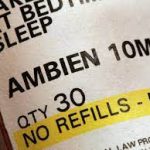Does Taking Ambien For 10 Years Have Long-Term Effects? FAQ

Ambien is a brand of zolpidem a medication used to treat insomnia (difficulty falling asleep or staying asleep). Zolpidem oral tablets are available as both generic and brand-name drugs. Brand names: Ambien (immediate-release tablet), Ambien CR (extended-release tablet), Edluar (sublingual tablet), Intermezzo (sublingual tablet).
Zolpidem belongs to a class of medications called sedative-hypnotics. It works by slowing activity in the brain to allow sleep. Zolpidem increases the activity of GABA. GABA is a chemical in your body that causes sleepiness. Increasing its activity helps you fall asleep.
How should Zolpidem be used?
Zolpidem comes as a tablet (Ambien) and an extended-release (long-acting) tablet (Ambien CR) to take by mouth. Zolpidem also comes as a sublingual tablet (Edluar, Intermezzo) to place under the tongue and an oral spray (Zolpimist), which is sprayed into the mouth over the tongue. If you are taking the tablets, extended-release tablets, sublingual tablets (Edluar), or oral spray, you will take the medication as needed, not more than one time a day, immediately before bedtime. If you are taking the sublingual tablets (Intermezzo), you will take the medication as needed, not more than one time during the night if you wake up and have difficulty returning to sleep. Zolpidem will work faster if it is not taken with a meal or immediately after a meal. Follow the directions on your prescription label carefully, and ask your doctor or pharmacist to explain any part you do not understand. Use zolpidem exactly as directed.
You will probably become very sleepy soon after you take zolpidem and will remain sleepy for some time after you take the medication. Plan to go to bed right after you take zolpidem tablets, extended-release tablets, sublingual tablets (Edluar), and oral spray and to stay in bed for 7 to 8 hours. Take zolpidem sublingual tablets (Intermezzo) only when you are already in bed and can remain in bed for at least 4 more hours. Do not take zolpidem if you will be unable to remain asleep for the required number of hours after taking the medication. If you get up too soon after taking zolpidem, you may experience drowsiness and problems with memory, alertness, or coordination.
Swallow the extended-release tablets whole; do not split, chew, or crush them. Tell your doctor or pharmacist if you cannot swallow tablets.
Do not open the pouch that contains the sublingual tablet (Intermezzo) until you are ready to take the tablet. To remove the sublingual tablet (Edluar) from the blister pack, peel off the top layer of paper and push the tablet through the foil. To take either brand of sublingual tablet, place the tablet under your tongue, and wait for it to dissolve. Do not swallow the tablet whole or take the tablet with water.
To use the oral spray, follow these directions and those that appear on the package label:
Before using zolpidem spray for the first time, or if you have not used the spray bottle for 14 days, you must prime the pump.
Line up the arrows on the cap and the base of the container. Squeeze the cap at the arrows and pull the cap and base apart to separate. Remove the clear protective cap from the pump.
To prime, the pump, hold the container upright. Point the black spray opening away from your face and other people. Press down on the pump with your forefinger, release and let it return to the starting position, and repeat 4 more times. You should see a fine spray come out of the container.
To use zolpidem spray, hold the container upright with the black spray opening pointed directly into your mouth, over the top of your tongue. Press down fully on the pump to make sure that a full dose of zolpidem is sprayed.
Let the pump return to the starting position. If your doctor prescribed only one spray of zolpidem, put the clear protective cap back over the pump at the top of the base after each use. If your doctor has prescribed two sprays of zolpidem for your dose, a second spray should be used.
Snap the child-resistant cap back onto the base and rotate the cap and base so that the arrows are not lined up. This is to help prevent a child from using the spray mist bottle.
Your sleep problems should improve within 7 to 10 days after you start taking zolpidem. Call your doctor if your sleep problems do not improve during this time or if they get worse at any time during your treatment.
Zolpidem should normally be taken for short periods of time. If you take zolpidem for 2 weeks or longer, zolpidem may not help you sleep as well as it did when you first began to take the medication. Talk to your doctor about the risks of taking zolpidem for 2 weeks or longer.
Zolpidem may be habit-forming. Do not take a larger dose of zolpidem, take it more often, or take it for a longer time than prescribed by your doctor.
Do not stop taking zolpidem without talking to your doctor, especially if you have taken it for longer than 2 weeks. If you suddenly stop taking zolpidem, you may develop unpleasant feelings or mood changes or you may experience other withdrawal symptoms such as shakiness, lightheadedness, stomach and muscle cramps, nausea, vomiting, sweating, flushing, tiredness, uncontrollable crying, nervousness, panic attack, difficulty falling asleep or staying asleep, uncontrollable shaking of a part of your body, and rarely, seizures.
You may have more difficulty falling asleep or staying asleep on the first night after you stop taking zolpidem than you did before you started taking the medication. This is normal and usually gets better without treatment after one or two nights.

Can I take half an Ambien in the middle of the night?
No, only take Ambien as a single dose each night. Do not take it a second time during the same night. Ambien must be taken at the beginning of the night and most people with middle-of-the-night insomnia don’t have it every night. If taken too late, they can lead to sedation the next morning.
Zolpidem will make you fall asleep. Never take Ambien, Edluar, or Zolpimist if you do not have a full 7 to 8 hours to sleep before being active again.
How much melatonin is equal to Ambien?
Ambien and melatonin are two different medications with equally different mechanisms of action and dosages. The recommended initial dose of Ambien CR is 6.25 mg for women and either 6.25 or 12.5 mg for men, taken only once per night immediately before bedtime with at least 7-8 hours remaining before the planned time of awakening. While there is no official recommended melatonin dosage for adults, a range of 0.5 milligrams to 5 milligrams appears to be safe and effective. Adults can take melatonin about one hour before bed.
What happens when you take Ambien and stay awake?
Ambien works by inhibiting natural brain activity and inducing drowsiness to the point of intense sedation and calmness which causes a person to fall asleep. People who take Ambien and force themselves to stay awake are much more likely to perform unconscious actions and not remember them.
In addition, taking Ambien and staying up awake can cause problems the next day, like difficulty driving, daytime drowsiness, dizziness, blurred or double vision, reduced alertness, or prolonged reaction time.
Does Taking Ambien For 10 Years Have Long-Term Effects?
Zolpidem is for short-term use only. Do not take zolpidem for longer than 5 weeks without your doctor’s advice. Ambien is usually prescribed for no more than six weeks and recommended for shorter periods of time, if possible. However, some individuals find it difficult or impossible to sleep without Ambien, and they may continue to use the drug past the recommended timeframe.
A study published in the Sleep Journal confirmed the efficacy of 3 to 7 nights per week dosing of zolpidem extended-release 12.5 mg for up to 6 months. According to researchers, the treatment provided sustained and significant improvements in sleep onset and maintenance and also improved next-day concentration and morning sleepiness.
However, according to its DEA Scheduling, Ambien has a low potential for dependency and abuse. However, self-medicating or long-term use of Ambien use can result in significant physical and psychological dependence, which increases the risk of withdrawal symptoms when you try to stop using it.
Does Ambien ruin your brain?
Ambien like benzodiazepines acts on receptor cells in the brain that bind with GABA (gamma-aminobutyric acid), a brain chemical that influences sleep and other neurological activities. Some users have experienced negative cognitive or psychological side effects to Ambien, such as memory loss and difficulty concentrating.
What are the other side effects of Zolpidem?
The more common side effects of zolpidem can include:
- headache
- drowsiness
- dizziness
- diarrhea
- dry mouth
- chest pain
- palpitations (fast, strong, or irregular heart rate, or feeling like your heart is skipping a beat)
- grogginess
- lightheadedness
- muscle pain
If these effects are mild, they may go away within a few days or a couple of weeks. If they’re more severe or don’t go away, talk with your doctor or pharmacist.
Serious side effects
Call your doctor right away if you have serious side effects. Call 911 if your symptoms feel life-threatening or if you think you’re having a medical emergency. Serious side effects and their symptoms can include the following:
- Allergic reactions. Symptoms can include:
- swelling of your tongue or face
- trouble breathing
- New or worse symptoms of depression. Symptoms can include:
- thoughts of suicide or of harming yourself
- loss of interest in activities you normally enjoy
- feelings of guilt or worthlessness
- lack of energy
- trouble thinking or concentrating
- weight loss or weight gain
- Abnormal thoughts or behaviors. Symptoms can include:
- agitation
- being more outgoing than normal
- thinking things aren’t real or that you’re watching yourself from outside of your body
- hallucinations (seeing or hearing things that aren’t there)
- Doing activities while you’re asleep and having no memory of the event. These can include:
- driving
- preparing and eating food
- talking on the phone
- having sex
- Trouble breathing. Symptoms can include:
- slowed breathing
- shallow breathing
- tiredness
- decreased oxygen in your blood
- Amnesia (memory loss)
- Hallucinations (seeing or hearing something that isn’t there).





